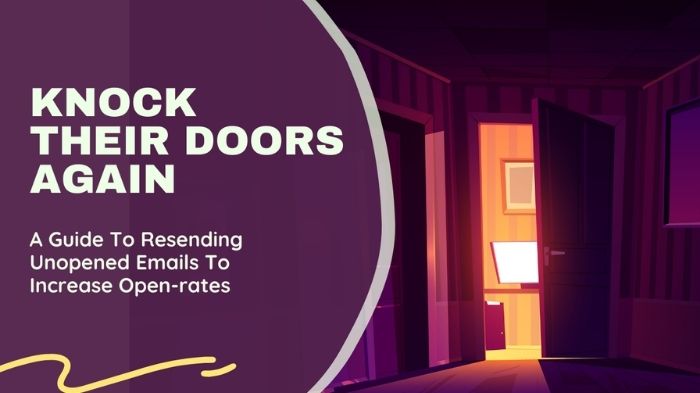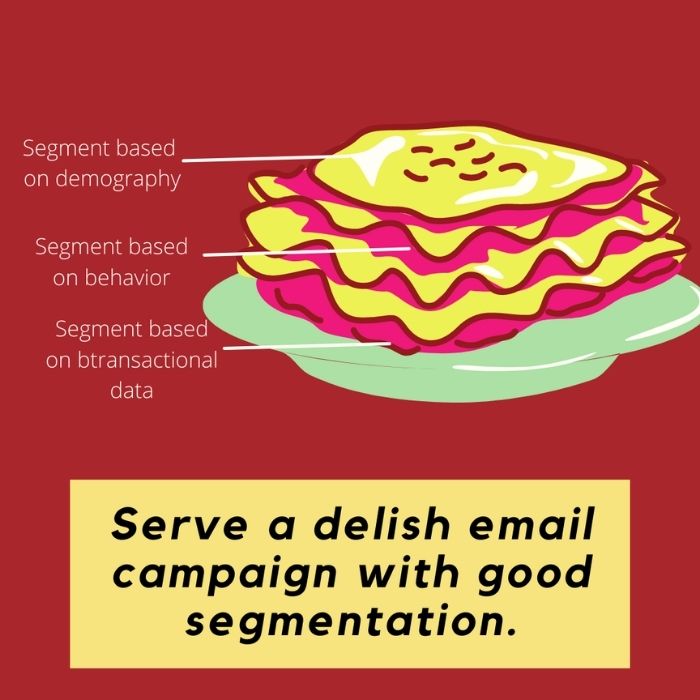
Knock, Knock.
Who’s there?
It’s me! A cold pitch with absolutely no research on the target audience delivered at the wrong time.
Slam. Hard slam.
Let’s face it.
Unless you work really hard on becoming good friends with your customers by catering to their needs at the right time and with the right message, you are annoying. Period.
Your customers glimpse at their inbox like a hawk – visually filtering out insignificant emails and probably multitasking at the same time, say incessant scrolling on their phones or munching some snacks.
The reality is that you have very scarce attention from your ideal audience which would wither away if you don’t stand out.
This is partially the reason why a portion of your recipients ends up in the “Unopened” bucket of your metrics report.
But, that’s not the end of it.
You can still knock on their doors again, and if done right they might welcome you with a warm smile.
In this article will cover some critical strategies that you can adapt to make sure that your unopened emails get opened in the next level of follow-up.
Let’s begin.
A Guide To Resending Unopened Emails To Increase Open-rates
Subject line analysis
Brushing aside a plethora of other reasons as to why your email was not opened, let’s look at the most straightforward and obvious one.
Your subject lines were not great. Simple.

Emails get opened because the subject lines cut through the inbox clutter and stood out and if they did not get opened, then the opposite is true.
A bad subject line is not just to do with how attractive the copy is, but also how strategic it is. Let’s look at some common pitfalls of a poorly crafted subject line.
Common pitfalls of a poor subject line:
- It lacks personal connection. The subject line does not call out the recipient’s name or any other data point they can connect with. Also, it is not from an individual, rather has the company name as the sender
- The preheader text is a mess. It does not summarize the email and does not give a quick idea of what the recipient can expect if they open the email
- It does not instigate an emotional connection. It fails to create urgency, the FOMO effect, and more
- It has little to no effort in the story it is trying to narrate (this is to do with lack of segmentation efforts) which will be discussed now
Let’s be honest.
We all like a delish portion of Lasagna. Don’t we?
How’d you like it if it is served all mixed up?
The pasta sauce, noodles, mozzarella, and parmesan cheese all ruffled up without any careful layering.

It defeats the essence and purpose of the cuisine.
Such is the impact of blasting out emails randomly without any careful segmentation.
The perks of segmenting your list have an inverse ripple effect on your campaign – Right from clicks and conversions to working your way back to the subject lines so that they get opened.
How to segment your list like a Lasagna
Depending on what your business is and the goals of your email marketing campaign, the kind of segmentation that you want may vary.

So, here are some broad ideas from which you can pick the segmentation idea that is the most suitable for your business.
- Segment based on demography
Segmenting your audience based on demography helps you sort out your contacts on a high level, say gender, income, and various other social and economic data points.
- Segment based on geography
Segmenting your audience based on geography can help you cater to the native events, trends, culture, and practices rather than shooting emails that have no context
- Segment based on behavioral data
This is the most crucial type of segmentation that can help you connect with your recipients on a deeper level. You can segment your audience based on their interaction on your store or website, ie based on whether or not they placed orders, added or abandoned items in the cart, and more
- Segment based on transactional data
Transaction-based segmentation will help you improve the open rates of emails that are sent after the purchase, or to promote offers and discounts based on past purchases, and more
Pro Tip: There are email marketing tools like BayEngage, Mailchimp, Hubspot, etc that can help you segment your audiences. But, a lot of popular tools like Mailchimp and Hubspot do not offer powerful segmentation features that are available in the free plan. So, evaluate the tools thoroughly to make an informed decision.
Personalization is the by-product
What good comes with the process of segmentation?
Personalization!
You can personalize your subject lines and make them highly contextual.
This will improve your chances of unopened emails getting opened.
Avoid surprise visits: Know the right time to drop by
For the most part, your emails get ignored because the timing was not just right.
Your emails probably hit their inbox while they were having dinner, or probably snuggled down at midnight or early in the morning.

As far as the days and timing are concerned, you can find the ideal day and time based on what has been working for you in the past.
Based on the open rates of your previous campaigns, you can average out the best day and time to optimize your open rate success.
You can further schedule the campaigns for unopened based on this experimentation.
Generally, the standard practice is to avoid the weekends for obvious reasons, and Mondays and Fridays because Monday marks the beginning of a busy work week and you might be buried in a gazillion other emails. Fridays are pretty chilled and you can’t expect people to take action.
So, Tuesdays, Wednesdays, and Thursdays generally work.
You can time your campaigns at the start of the day, typically around 9 AM, 10 AM, 11 AM, and avoid lunch hours.
Pro Tip: Have you considered devices? For your recipients who are active on mobile devices, the optimal time could be late in the evening because people have the tendency to check their phones frequently after the workday while for desktop users working hours would be the optimal time.
Be a good guest: Let the recipients welcome you with a grin
If your recipients end up not opening your emails, you can always try harder by analyzing what went wrong and send your emails again.
But, you have to make sure that you make some tweaks to the email as if the recipient ends up opening both your emails, it might be a turn-off.
If you want to be a good guest, try to understand your customers – their tastes, preferences, lifestyle, and more.
Hope this article was useful to you, if you have any other points that you want to add, feel free to drop them in the comments section and we can have a chat!
Also Read:

